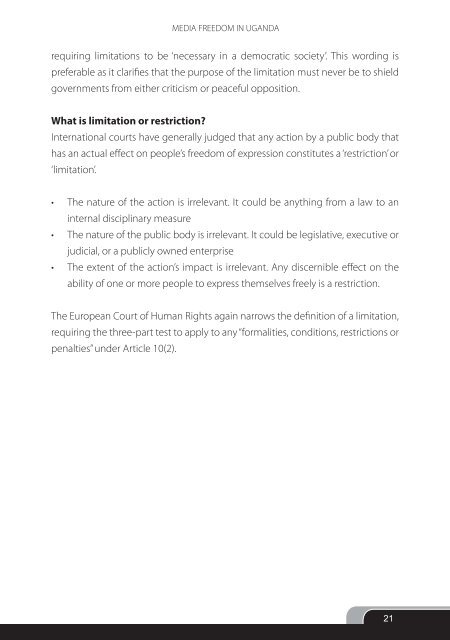Media_Freedom_in_Uganda_Analysis_of_inequitable_legal_limitations
Media_Freedom_in_Uganda_Analysis_of_inequitable_legal_limitations
Media_Freedom_in_Uganda_Analysis_of_inequitable_legal_limitations
Create successful ePaper yourself
Turn your PDF publications into a flip-book with our unique Google optimized e-Paper software.
MEDIA FREEDOM IN UGANDA<br />
requir<strong>in</strong>g <strong>limitations</strong> to be ‘necessary <strong>in</strong> a democratic society’. This word<strong>in</strong>g is<br />
preferable as it clarifies that the purpose <strong>of</strong> the limitation must never be to shield<br />
governments from either criticism or peaceful opposition.<br />
What is limitation or restriction?<br />
International courts have generally judged that any action by a public body that<br />
has an actual effect on people’s freedom <strong>of</strong> expression constitutes a ‘restriction’ or<br />
‘limitation’.<br />
• The nature <strong>of</strong> the action is irrelevant. It could be anyth<strong>in</strong>g from a law to an<br />
<strong>in</strong>ternal discipl<strong>in</strong>ary measure<br />
• The nature <strong>of</strong> the public body is irrelevant. It could be legislative, executive or<br />
judicial, or a publicly owned enterprise<br />
• The extent <strong>of</strong> the action’s impact is irrelevant. Any discernible effect on the<br />
ability <strong>of</strong> one or more people to express themselves freely is a restriction.<br />
The European Court <strong>of</strong> Human Rights aga<strong>in</strong> narrows the def<strong>in</strong>ition <strong>of</strong> a limitation,<br />
requir<strong>in</strong>g the three-part test to apply to any “formalities, conditions, restrictions or<br />
penalties” under Article 10(2).<br />
21


